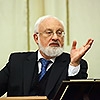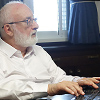Audio Version Of The Blog – 9/1/23
Listen to an Audio Version of the Blog
Download:MP3 Audio

Listen to an Audio Version of the Blog
Download:MP3 Audio
 Question: When you read a Kabbalistic text many times, let’s say ten, suddenly on the eleventh time you see a word that you did not notice before. What is the reason for this?
Question: When you read a Kabbalistic text many times, let’s say ten, suddenly on the eleventh time you see a word that you did not notice before. What is the reason for this?
Answer: This relates to the correction of a person. He invests many efforts, so he begins to understand the text more deeply and see new words and meanings.
[316972]
From the Daily Kabbalah Lesson 8/12/23, Writing of Rabash “The Importance of Faith that Is Always Present”
Related Material:
Become Similar to the Kabbalist Author
A Book Is a Spiritual Matrix
Not to Read, But to Attain!
 Question: If we are turning to you now so that you thank all the world’s tens from us for surrounding us, are we doing this as a gift to you personally?
Question: If we are turning to you now so that you thank all the world’s tens from us for surrounding us, are we doing this as a gift to you personally?
Answer: Of course. The fact that you turn to each other and each time the connection between you becomes stronger and stronger, this is a great gift for me.
Question: Can we give gifts to the Creator if we ourselves feel a sense of lack and dissatisfaction?
Answer: You lack the love that you can give to your friends and receive from them. There will be no feeling of lack when you start developing this feeling within yourself.
Question: You said that before giving a gift, you need to find out from a friend what is important to him. Is it possible to do this in relation to the Creator, to scrutinize in the ten the Creator’s need for a gift from us?
Answer: Yes. Moreover, with the Creator you can behave in different ways: you can imagine the ten with the Creator in the center of the ten, or you can imagine the ten as one common whole inside the Creator. Try both ways.
[317019]
From the Daily Kabbalah lesson on “Giving a Gift to the Creator” 8/13/23
Related Material:
Questions about Spiritual Work—11
Questions about Spiritual Work—10
Questions about Spiritual Work—9
 Question: The orthogonality theory of intelligence states that intelligence and final goals are orthogonal axes along which possible agents can freely vary; that is, more or less any level of intelligence could in principle be combined with more or less any final goal. It has also been construed to mean that smart people can pursue stupid goals. Intelligence and goals are orthogonal, unrelated to each other. No matter how smart the intellect, it can safely pursue absolutely stupid or poor goals.
Question: The orthogonality theory of intelligence states that intelligence and final goals are orthogonal axes along which possible agents can freely vary; that is, more or less any level of intelligence could in principle be combined with more or less any final goal. It has also been construed to mean that smart people can pursue stupid goals. Intelligence and goals are orthogonal, unrelated to each other. No matter how smart the intellect, it can safely pursue absolutely stupid or poor goals.
How can these two parameters be linked in order to actually use intelligence for high goals?
Answer: When you speak about the mechanism of the interaction of intellects, do you take into account whether they are purely intellectual or sensory?
Comment: At the moment, I consider them purely intellectual. That is, we are talking about intelligence divorced from sensations.
My Response: Then we are talking about mechanical devices and not about people or any sensory civilization.
Comment: But in fact, sensations are a person’s reception of information. It later gets evaluated, processed, and so on. And if we started the discussion with the isolation of human intellect from the field of sensations, then we in fact came to the conclusion that all this happens in conjunction with feelings.
My Response: It follows that we cannot take sensory parameters into account.
Question: But if a person feels something and is able to process these feelings, why can’t we take them into account? This is all the same information that comes to us in different forms. We feel something, analyze it, and act on it accordingly.
That is, this bundle is the high goal, methods of achieving it that are not related to goal, setting, and the sensory perception when receiving information—all this is completely shattered in a person.
It is unclear how it works. Maybe there is a point, a line through the center to connect it all? Or do we have no need for it?
Answer: The fact is that if we want to affect the workings of such systems, we must put at least a few conditions down that will not lead humanity to destruction, self-destruction. Then we will have a clear direction of where to set the limits in the system.
[316613]
From KabTV’s “Kabbalah Express” 7/31/23
Related Material:
What Is the Mind?
Attaining The Mind Of The Universe
The Acting Mind
 Question: If I have already attempted to accomplish a goal and have not achieved it, do I need to continue to work toward it?
Question: If I have already attempted to accomplish a goal and have not achieved it, do I need to continue to work toward it?
Answer: If you feel that your goal is not achievable in the nearest future, you need to review your attitude to it.
Perhaps you will still not abandon it and will continue to realize it. It is also possible that you will decide that you have to leave it maybe for good or maybe for some time and start doing something different and more realistic.
[316663]
From KabTV’s “Kabbalah in the modern turbulent world” 8/3/23
Related Material:
Patience and Perseverance
Patience Is Perseverance
Most Important Is An Abundance of Patience
 Question: How can we explain the advantage of sensory transmission of information from person to person?
Question: How can we explain the advantage of sensory transmission of information from person to person?
Answer: There is no way to explain it because people will not be able to work with this anyway.
Now everyone remembers how in 1997 scientists received a Nobel Prize for developing a theory about the absence of the probability of an economic crisis, as a result of which a society of unlimited consumption can develop endlessly.
How can this be if natural resources are being exhausted, if pollution reaches such magnitudes that it buries us under garbage in this huge earth dump? How can one write that a society of unlimited consumption can develop endlessly and all people on earth, absolutely everyone, will be able to reach unlimited opportunities, and unlimited success? From where?
I was surprised by this view of the world when I visited Disney World’s Epcot Center for the first time 30 years ago. Epcot Center is a round building, which you enter by a little train and you are shown the entire history of humanity from the past, present, up to the future. The future is represented by the fact that everyone has a helicopter, walls of houses are covered with televisions, etc. That is, everything is so fancy. They placed a person in a state from which he cannot get out. What a future!
Egoism blinds us so much that we invent such theories and give Nobel Prizes for them, believing that there will be no end to our development, although long before that the Club of Rome and other scientists said that everything ends.
Why do we award such economists the Nobel Prize? Because we want it to be so. Can you imagine what a self-deception this is?! What can we come to? How can we explain to a person that there are other technologies if people cannot change themselves?
Comment: But you say that in the end, they have to come to it anyway.
My Response: I think that nowadays it is just getting to the point of personal and common internal correction in order to reveal inside ourselves the next level of the universe, the spiritual state. Then this world will involuntarily disappear from our perception. As soon as we begin to feel spiritual qualities, forces, and systems inside ourselves, we will stop seeing this world.
[314358]
From KabTV’s “I Got a Call. Consumer Society” 6/27/11
Related Material:
Where Did The Rosy Prospects Go?
Life Is Not A Random Set Of Events
Rise Above The Body

New Life 255 – Relationships With Neighbors
Dr. Michael Laitman in conversation with Oren Levi and Nitzah Mazoz
Why are there many conflicts between neighbors? Can we learn to live together by changing our attitude to one of goodwill?
My neighbor is basically “inside my house” with his noise, his smells, his music, etc.
When one makes good connections with neighbors, everyone benefits. It’s hard to tolerate neighbors because there is no buffer between us. They are as if “under my skin.” If my daughter makes noise, I may be fine with that. But next door ?! If we can break the walls of our heart and feel closer, there will be fewer problems with the neighbors.
In neighborly relations, there is no point in trying to determine who is right and who is not, but only to build good relationships. You can create a sense of paradise inside the building—a cloud of calm, confidence, and warmth.
A series of events to foster good relations between neighbors could be scheduled. Neighbors might start with a connection workshop to talk about the good things and the good people in our building. A shared sense of “home” can bring a person security and warmth that he will never achieve in his private apartment.
This could be followed with a good neighbors workshop: In a circle, each one expresses good things about the other, even if they don’t know each other. When I have a good thought about them, it already makes me feel better in the building. This workshop could include an exercise: During the week, write in a few sentences what you went through with the neighbors in the building. At the end of the week, everyone briefly describes what living in our shared home this week felt like.
[123672]
From KabTV’s “New Life 255 – Relationships With Neighbors,” 11/17/13
This summary was written and edited by students of Kabbalist Dr. Michael Laitman
 Michael Laitman, On Quora: “What is the difference between learn and read Torah?“
Michael Laitman, On Quora: “What is the difference between learn and read Torah?“
“When a person learns Torah, he must intend that the Torah and Mitzvot he is doing will help him emerge from the control of the evil.” – Kabbalist Baruch Ashlag (Rabash), “What Is ‘The Earth Feared and Was Still,’ in the Work.”
Learning Torah requires applying an intention to change our egoistic nature, which makes us want to enjoy ourselves at the expense of others, to its opposite.
By intending to turn ourselves into altruists who connect positively to each other, it means that we use what is called “the light”—the upper light, the upper energy, the light of the Torah, or the Torah itself—in order to correct ourselves, i.e., to change ourselves from egoists to altruists.
Learning Torah thus means constantly feeling what is happening to us at the level of our desires, thoughts and actions. It is learning not with the mind, but with the heart.
By learning Torah, we conduct inner work on the path to life’s goal, and we use the Torah as the force that corrects us, i.e., which inverts our nature from egoistic to altruistic. Thanks to such a force, we can then identify the evil within us—our egoistic nature—to the extent that it eventually ceases to exist.
After such a diagnosis, the Torah turns the evil in us into goodness and we then resemble the Creator, the absolute good force of love, bestowal and connection. We then become filled with love and bestowal toward others and through them to the Creator, the force of love and bestowal itself. We then discover what is called “the whole world is filled with His glory.” In other words, we reveal the Creator—the force of love, bestowal and connection—as existing in everyone and everything.

Based on the Daily Kabbalah Lesson with Kabbalist Dr. Michael Laitman on August 6, 2023. Written/edited by students of Kabbalist Dr. Michael Laitman.
Photo by Taylor Flowe on Unsplash.
Preparation to the Lesson
1st part of the Lesson — Writings of Rabash, “What Are Commandments that a Person Tramples with His Feet”
2nd part of the Lesson — Lesson on the Topic, “Purifying the Heart”
3rd part of the Lesson — Writings of Baal HaSulam, “General Preface” Item 1
Selected Highlights